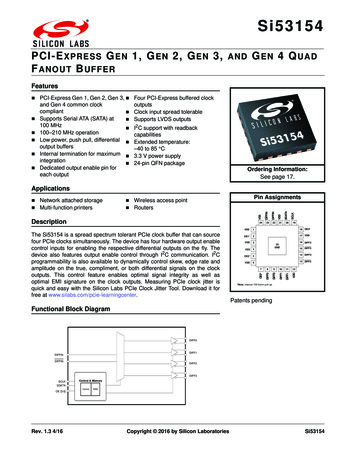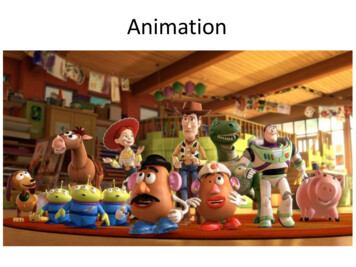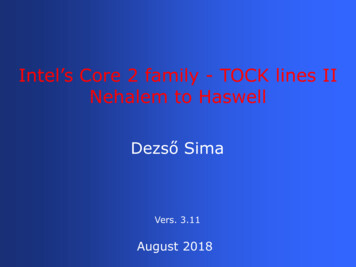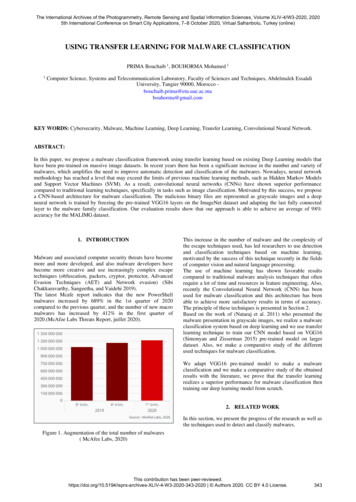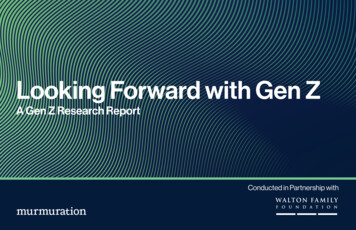
Transcription
GEN Z RESEARCH REPORT FINDINGSLooking Forward with Gen ZA Gen Z Research ReportConducted in Partnership with 2022 Murmuration. All rights reserved.1
GEN Z RESEARCH REPORT FINDINGSINTRODUCTION 2022 Murmuration. All rights reserved.2
GEN Z RESEARCH REPORT FINDINGSLots of people are talking ABOUT Gen Z. Far fewer aretalking TO young people. That has to change.From the Harvard Youth Poll to Deloitte’s Global Survey, excellent contributions by the Pew Research Center and myriad other studies and surveys, there’s a growing body of work that has helped tomake us aware of Generation Z’s (who we also refer to as Zoomers throughout this report) values, their political activity, and interests. Understanding this generation of young people is only part of thechallenge, however. We must also prepare ourselves, and our institutions, for a future where Zoomers are increasingly in positions of leadership and influence – and that includes helping them to attainthose critical roles. We must find ways to listen and thoughtfully engage with the members of Gen Z, as co-workers, classmates, and neighbors, so that future plans for every sector of our society arebeing developed collectively.12Through our research we have identified three important themes:FAMILY, COMMUNITY, AND MENTAL HEALTH COME FIRSTYoung people prioritize their own health and happiness, and the health and happiness oftheir friends and family, over getting involved in politics, advocacy, or other efforts. They caredeeply about the issues our society is grappling with (inequality, racism, school shootings,climate, democracy, etc.), but they don’t always have the bandwidth to do both. Having seen thechallenges that their parents have faced, and in many cases the limits on their ability to drive themeaningful change they seek, they are choosing to make sure they are okay before consideringanything else. The investments we make to ensure more and better support for mental health,and the rebuilding of a sense of community throughout the country, will help to unlock thetremendous power that Zoomers possess.3TIME FOR A NEW SOCIAL CONTRACT – GEN Z IS CHARTING ADIFFERENT COURSESuccess for America’s rising generation is defined as living a basic, balanced life that enablesone to afford a stable home, but also provides the flexibility to travel, explore their passions, andspend time with family and loved ones. They talk openly about not wanting to follow the path oftheir parents and grandparents – working to exhaustion, with little time for family and individualpursuits, pledging loyalty to one job or industry, etc. This gives them motivation to challenge tiredcorporate policies and redefine work-life harmony.INSTITUTIONS ARE IN TROUBLE, THEIR REPUTATIONS ARE ATRISK, AND TRUST MUST BE REBUILTZoomers have low expectations that the government, corporations, and other institutions willprioritize them or take their needs into consideration. They see the purpose of education toprepare them, in very practical ways, for life after high school – and yet, overwhelmingly they feellike their K-12 education did not prepare them adequately to enter today’s world. They reportthat political and government leaders are not considering their needs when setting priorities,and instead favor the elite and overtly partisan opinions. Gen Z will soon be the largest cohortof eligible voters in the country – and they do plan to vote – giving them tremendous power toremake institutions in ways that support their vision for the future. 2022 Murmuration. All rights reserved.3
GEN Z RESEARCH REPORT FINDINGSWhy we conducted this researchWhat this research entailedMurmuration’s mission is to transform the politics of K-12 public education so that every child inAmerica has access to equitable and high-quality public schools. We partnered with the WaltonFamily Foundation because we shared an interest in the increasingly important role that Gen Zplays in our nation and wanted to further the conversations about Gen Z’s role in society. To dothat, we specifically embarked on a project that builds on previous research and adds depth andcolor to vital questions:This research project was led by longtime Murmuration collaborator, SocialSphere’s John DellaVolpe, the founder and director of the Harvard Youth Poll and author of the critically acclaimedFIGHT: How Gen Z is Channeling Their Fear and Passion to Save America. The focus ofthe study was young people, ages 15-25. It was conducted in two phases:How did their K-12 education prepare them for these and otherchallenges; and12What do they expect from older generations? From the government?From corporations? From educational institutions? From society atlarge?What happens nextnHow does Gen Z see themselves and their future?nWhat are their goals for the next stage of their personal andprofessional lives?nWhat are the essential issues they believe America must address?nnBecause this research builds on a wealth of insights, we were able to focus on generating datathat would inform actionable recommendations. We prioritized questions that we felt wouldbenefit business, political, government, social sector, and community leaders and institutions.And we had conversations that provided important insights to help shape approaches that cangenerate forward progress. 2022 Murmuration. All rights reserved.Four large, town hall-style focus groups conducted in Houston, Atlanta,Columbus, Ohio – and supplemented by two small groups of Zoomersliving in Arkansas (N 60).The qualitative phase was followed by an extensive national survey ofAmericans between 15 and 25 (N 3,085), and people over age 25 forcomparison (N 1,108). The survey was fielded between May 27 andJune 4, 2022.This one study will not answer all the questions that we have for, or about, the members of GenZ. Murmuration has already begun a next phase of research to further explore the findings thatwere surfaced as part of this project, and to begin developing specific messages and framesthat we believe can help CEOs, political and government actors, education champions, andother key leaders and institutions to communicate with, and to Zoomers. We see tremendouspotential to engage Zoomers as never before, getting them involved and workingtogether to reshape our society in the years ahead.4
GEN Z RESEARCH REPORT FINDINGSPREAMBLE:REINTRODUCING GEN Z 2022 Murmuration. All rights reserved.5
GEN Z RESEARCH REPORT FINDINGSGen Z Has Gone (and Is Going) Through A LOTGen Z is now 70 million strong, and is considered to be the most ethnically and racially diversegeneration in American history. Pew notes that a “bare majority” are White, (52% are nonHispanic white, compared to 61% of millennials in 2002 when they were in the same age range),a quarter are Hispanic, 14% are Black, 6% Asian, and 5% are another race, ethnicity or mixed.One of the many things that makes this generation of Americans unique is that Gen Z has comeof age in a time of tremendous national chaos and trauma – but unlike other generations, Gen Zhas not experienced a moment when America was united.From the time they were very young, Zoomers lacked the sense of personal, financial, andphysical security their parents’ and grandparents’ generations often took for granted. Some80% percent of families lost 20% of their wealth (and tens of millions of homes) in the GreatRecession between 2007-2009. By the time Zoomers were ready for school, red alert lockdowndrills and school shootings were expected – and soon they would see too many membersof their community lose battles to opioids and depression. All of this happened before thecoronavirus lockdowns robbed them of critical time in the classroom and with friends. And, fromthe beginning, their experiences have been reflected through the lens of social media, givingthem unprecedented access to diverse experiences and people, while also in some casesdistorting their understanding and exacerbating their struggles.Rather than withdrawing from public life, the collective research has shown that Zoomers haveadopted a progressive, solutions-based political mindset. It has been these experiences, alongwith contentious and close elections for the White House, concerns about income inequality,climate change, systemic racism, and other events that have led to record levels of youthparticipation in both the 2018 and 2020 national elections.Zoomers have proven to be a highly collaborative, self-reliant, and pragmatic generation,concerned not just about their own well-being, but wanting to lift up their friends andcommunities as well. These attributes have given Zoomers confidence to forgo traditionaleducation, move between jobs, and set priorities that are different from generations that camebefore them. And by 2028, along with like-minded millennials, they will be the largest group ofeligible voters in the country, giving them the potential for significant power and influence.Generation Z will change everything (the question ishow)It’s already evident – from the pressure they are putting on employers, to their taking to thestreets to protest gun violence or promote reproductive health, to voting – that Zoomers will havean outsized influence on the future of the nation, and society more broadly. What is less clear isthe shape that those changes will take. This report explores four categories, on their own and inthe relationship between them, where Zoomers have met resistance in pursuing their vision of amodern society:POLITICS: Zoomers have turned out to vote in record numbers in consecutive elections(they delivered the White House and Senate to Democrats in 2020 and 2021); and in 2024,along with millennials, they will account for 40% of the electorate. The Harvard Youth Pollshows that across more than a dozen social, domestic, and global issues, they are moreprogressive than the previous millennial generation when they were the same age. Evenamong Republicans, Gen Zers are less conservative than previous generations andtake a more pro gres sive stance on a number of social issues. For example, Gen ZRepublicans are more likely to agree that Black people are treat ed unfair ly in thiscoun try. They believe the gov ern ment should play a greater role in solv ing prob lems, andthey are more like ly to attribute cli mate change to human activ i ty, as opposed to nat ur alpatterns.SCHOOL and WORK: Despite struggles that have emerged as a result of the pandemic,which have delayed or disrupted learning across the board, Zoomers have higher highschool graduation rates and lower dropout rates than those who came before. And whilethey are heading off to college in high numbers, many are reevaluating the costs and benefitsof traditional higher education given the dramatic rise in expenses and the impact of studentloan debts. The cost-benefit considerations around higher education are that much morechallenging since Zoomers do not feel prepared to succeed in these environments in thesame ways that previous generations have.What does all this add up to? 2022 Murmuration. All rights reserved.6
GEN Z RESEARCH REPORT FINDINGSTECHNOLOGY and CULTURE: Gen Z is the only generation to grow up entirely in thedigital age; for better or worse, social media is not a tool, it’s a part of their identity. This hasaltered the way they think and how they act relative to other generations. Whether it’s alaptop in school or at work, a device always in hand, or a social platform being central topolitical engagement, Zoomers do not make a distinction between real or virtual life, evenwhile older cohorts still struggle to reconcile the differences and manage the impact of a lifeturned increasingly transparent, connected, and social.FAMILY and COMMUNITY: Zoomers value their relationships. Family, along with theirhobbies and interests, are the most central elements of their personal identities. For most,sexual identity is more fundamental to who they are than college, socio-economic class, orpolitical ideology. And mental health, where Zoomers have openly and transparently sharedtheir struggles, informs every choice they make and connection they form at this stage oftheir lives.Gen Z is beginning to reveal how they believe our nation and society should move forward. Whatis also apparent is that what Gen Z believes should happen does not, in many cases, align withthe choices and priorities that today’s decision-makers believe are important. That tension willdefine our politics, economy, institutions, and culture in the years ahead.This research was developed to help ease those tensions, and provide CEOs, political andgovernment actors, academic champions, and other leaders and institutions with guidance andinsight. In the pages that follow we will detail the results of our research, what it means, and theactions we believe can be taken to better engage – and involve – Gen Z in shaping the future. 2022 Murmuration. All rights reserved.7
GEN Z RESEARCH REPORT FINDINGSSECTION 01IDENTITY ANDMENTAL HEALTH 2022 Murmuration. All rights reserved.8
GEN Z RESEARCH REPORT FINDINGSGen Z is Stressed and in Crisis (But Not Giving in)At a time when it is challenging to find a consensus of opinion on nearly any topic, one themethat emerges from informal conversations, survey research, government- and healthcarerelated data is that Gen Z is in the midst of a mental health crisis. In the spring 2022 edition of theHarvard Youth Poll, nearly three-quarters of young Americans (72%), and those on both sidesof the aisle – 76% of Democrats and 72% of Republicans – agreed that “the United States has amental health crisis.”This “Looking Forward with Gen Z” survey found that relative to their elders over age 25, Gen Zis about twice as likely (42% to 23%) to battle depression and feelings of hopelessness. Theyare also three times as likely (18% to 5%) to say their challenges are so severe that they have hadthoughts of self-harm or that they might be better off dead.Across the board, more adolescents and young Americans are grappling with mental health andother challenging issues than those from older generations.Our poll also found:nMore than half of Zoomers (52%) know someone battling depression.nOne-third (32%) have someone close to them who has been a victim ofsexual assault.nNearly a quarter (24%) have someone close to them dealing with opioid orother drug addiction.nOne-fifth (20%) know someone who has died by suicide.nAnd 14% say they know someone who’s been a victim of gun violence. 2022 Murmuration. All rights reserved.Over the last two weeks, how often have you been bothered by the following problems?Gen Z (15-25)60%Millennials (26-41)Gen X (42-57)Boomers/Silent (58 )61%53%42%40%40%28%28% 29%18%20%18%10%Feeling nervous, anxious or onedgeFeeling down, depressed, orhopeless6%2%Thoughts that you would bebetter off dead, or thoughts ofhurting yourself in some wayNet: At least several daysSource: SocialSphere, Inc.9
GEN Z RESEARCH REPORT FINDINGSWhile every generation faces its share of challenges, the urgency and seriousness of what Zoomers are dealing with is stressing the systems designed to support and respond. Exacerbating theanxiety and fear of young Americans is a sense that parents, mentors, teachers, employers, and older generations more broadly are unable to understand, or worse, are dismissive of the depth of theirstruggles. A high school student from Houston articulated these frustrations in one of this study’s town halls:For me personally, over the last five years, I’ve lost threepeople to suicide or mental health, which is really crazy tome. And it’s like where I go to school, my middle school andmy high school are literally right across the street where Igrew up and am growing up, they don’t understand kidsnowadays have struggles. We struggle too. And it’s hardfor us to keep going and then have an adult be like, ‘Well,what are you stressed about? You have nothing to bestressed about. You’re a kid.’ And it’s like, I have manythings to be stressed about.”– High School Student, Houston 2022 Murmuration. All rights reserved.10
GEN Z RESEARCH REPORT FINDINGSZoomers Want to Be Part of Something BiggerThan ThemselvesWhile Zoomers are centered by a largely shared set of values and vision for what will makethem happy and fulfilled, they are open to working with others to achieve a common goal. Usingpolitics as an example, more than four in five agree (41% strongly and 42% somewhat agree)with the sentiment that “even if we disagree 90% of the time, it is important that we find the 10%of things we agree on so that we can make progress.”Despite these ongoing struggles with mental health – and seemingly never-ending personaland public trauma – an integral and unique element of Gen Z’s identity is a calling to be part ofsomething bigger than themselves. It would be understandable if Zoomers chose to shrink awaygiven the challenges facing our society today, but our data shows that more than two-in-fivestrongly agree they want to make their community and country better – a number that exceedsmillennials, Gen X, baby boomers and the silent generation.While Zoomers struggle and often have their own bouts of anxiety and sense of hopelessness,their resilience and empathy more often than not shines through. Today, Zoomers see standingup for the voiceless as central to their identity, more than any other generation in America.Standing up for those who are vulnerable, or without a voice is an important part of who I am.Gen Z (15-25)44%Millennials (26-41)37%Gen X (42-57)37%Boomers/Silent (58 )33%% who "Strongly Agree"Source: SocialSphere, Inc. 2022 Murmuration. All rights reserved.11
GEN Z RESEARCH REPORT FINDINGSSECTION 02POLITICS,GOVERNMENTANDOTHER INSTITUTIONS 2022 Murmuration. All rights reserved.12
GEN Z RESEARCH REPORT FINDINGSGen Z is Losing Faith in Government and Politics (ButStill Thinks Democracy is Important)It has now been well documented that Gen Z and young millennials voted at historic levels in thelast two federal elections. Their level of civic participation surpassed older millennials, Gen X,and baby boomers when they were younger. Additionally, it was youth’s overwhelming supportfor Democrats in 2018 and 2020 that played an essential role in delivering the White House andCongress to Democrats in recent elections.Less than two years later, along with scores of older Americans, Zoomers are growingincreasingly dissatisfied with the trajectory of our politics and the nation. Only 7% describe theUnited States as a healthy democracy according to the fall 2021 Harvard Youth Poll.Despite these concerns, Gen Z continues to engage at levels that exceed other generationswhen they were of similar age. The number of young people expected to vote is tracking moreclosely with historic 2018 turnout than with 2014 and prior elections. About half are regularlydiscussing politics with peers.Through our qualitative and quantitative research, we see that Zoomers understand that robustgovernment action is required to solve the systemic inequities and major challenges faced byour society. While Zoomers are dissatisfied and disappointed with the pace and scale of changein Washington, they believe America can only live up to its promise if they as young peoplecontinue to engage and fight. As a young woman from Atlanta explained in one of this study’stown halls:Our generation wants the country to change for the better.And when given tools, education, resources, and making achoice to band together, we can make change.”– Young Woman, Atlanta 2022 Murmuration. All rights reserved.13
GEN Z RESEARCH REPORT FINDINGSMany Zoomers described to us a desire to prioritize their own health and happiness beforecommitting to civic action – because they understand that it will take all their energy and focusto drive the changes that are necessary to improve our society. Two-thirds of Gen Z reject thecynical argument that change is nearly impossible – Zoomers believe that the challenges weface are so urgent and great, they have no choice but to participate in every possible way. And42% of Zoomers, more than any other generation, strongly agree with the sentiment that theywant to be a part of something that improves their community and country.Which statement is closer to your own view?Challenges are so great, mustengageNearly impossible, do notengage18%19%15%67%15%17%18%66%9%15%67%Don't knowGen Z (15-25)Millennials (26-41)Gen X (42-57)74%Boomers/Silent (58 )Some/Other people say the size and scope of the challenges facing America are so great, it is nearly impossible to solve them. They say one person can’t really make adifference, so the wisest path is to focus on taking care of yourself and your family – and not engage politically. Other/Some people say that because the size and scopeof the challenges facing America are so great, we have no choice but to engage in every way possible. They say that even though government is ineffective – we mustengage politically, fight, and eventually change the system.Source: SocialSphere, Inc. 2022 Murmuration. All rights reserved.:14
GEN Z RESEARCH REPORT FINDINGSZoomers Will Collaborate for Progress (But TheyWon’t Compromise Their Values)While economic issues related to inflation and the deeper trends associated with the cost ofliving weigh heavily on Gen Z, young Americans very clearly voice significant concerns in thismoment about school shootings, and the erosion of fundamental rights and freedoms, whichinclude access to clean water and fresh air, personal safety, a quality education, housing, andhealth care. They are loudly calling for political and government leadership to address theseissues and are demanding big changes to these major problems.At least two-thirds of Gen Z find the following to bevery important issues facing America “right now”:nStopping school shootings (82% very important);nProtecting access to clean water and fresh air (72%);nReducing gun violence and mass shootings (72%);nGuaranteeing a quality education for every child (71%), andnPreserving individual rights and freedoms (67%)Public policy issues that many mistakenly believe drive Gen Z’s engagement (legalizingmarijuana, 23%), or animate older generations (limiting the size and scope of government, 26%,preserving traditional values, 29%, and securing our borders, 29%) ranked at the bottom of anexpansive list of issues shared with survey respondents. Political leaders too often only talk toyoung Americans about these issues, ignoring the opportunity to engage them on more serioustopics and would animate them and spark their interest in getting further involved.The chart to the right ranks the importance of 25 issues impacting the kind of America in whichZoomers want to live “right now” – along with Gen Z’s views of government performancein addressing each. The greatest gaps in the importance/performance grid are on thegovernment’s poor performance related to school shootings. 2022 Murmuration. All rights reserved.(A) Thinking about the kind of America in which you want to live – how important are the following issues to you rightnow? (B) How would you rate our nation’s performance on each of these issues?PERFORMANCEIMPORTANCE Stopping school shootings1.93Protecting access to clean water and fresh airGuaranteeing a quality education for every childReducing gun violence and mass shootings1.98Preserving individual rights and freedomsAccessing affordable housingDealing with the mental health crisisEnsuring that health care is a rightFighting crimeCreating jobsCreating an informed societyAddressing systemic racismSafeguarding the rights of vulnerable populationsUpholding women’s reproductive rightsProtecting religious freedomCombatting climate changeReducing income inequalityPreserving our democracyAddressing student loan debtPromoting civility in politicsLimiting the size and scope of governmentStrengthening America’s role in the worldPreserving traditional valuesSecuring our bordersLegalizing marijuana2.00 3.504.004.50(A) Scale: 1 Not important at all 5 Very important; (B) Scale: 1 Poor 5 ExcellentSource: SocialSphere, Inc.15
GEN Z RESEARCH REPORT FINDINGSGen Z Don’t Feel Heard or ValuedMost Zoomers do not believe that critical institutions and organizations are invested in listeningto their voice and understanding the values of people like them. This is true broadly in education,but it also applies to employers, elected officials and candidates, and others.Favorite brands (34%), local companies (34%), and local schools (32%) are considered mostin touch – but still only about a third of Zoomers say they are doing an excellent or good joblistening.With the exception of government (47% fair or poor) and elected officials (48% fair or poor)which about half of Zoomers rate negatively – other institutions benefit from a high level ofuncertainty. The reason? Without more access and information, Zoomers simply do not knowenough to form an opinion, so organizations have an easier path to connecting and buildingtrust.Global companies (24%), philanthropic organizations (26%), government (20%), and electedofficials (18%) fare more poorly.A lot of the folks that we see on TV, I don’t think theyrepresent what our voices go towards or what our opinionsare going towards. They might represent an oldergeneration, but even more so I don’t want to generalize theolder generation, but they represent a certain amount ofpeople with an interest. They have ulterior motives,whether it for lobbyists or their personal gains.”– Young Woman, Houston 2022 Murmuration. All rights reserved.16
GEN Z RESEARCH REPORT FINDINGSSECTION 03WORK & PRIORITIES 2022 Murmuration. All rights reserved.17
GEN Z RESEARCH REPORT FINDINGSGen Z Is Defining Success Differently (And Most AreConfident They Can Be Successful)It is Gen Z’s view of the world, not a quest for riches or the pressure applied by culture or friends,that affects most every personal, professional, and political decision they make.According to CareerBuilder, Gen Z’s average length of time spent at a job is 2 years and 3months. For millennials (26-40) that figure is 2 years and 9 months, while Gen Xers (41-56) wereat a job for an average of 5 years and 2 months, and baby boomers (57-75) spent 8 years and 3months at a job. This begs the question, what is Gen Z looking for? What are their aspirations?And how do they define success not only professionally – but personally?Raised in an era of considerable personal, financial and social volatility, Gen Z prizesindependence, community, and work that is fulfilling over nearly everything else as they growinto independent, self-sustaining adults. A young woman from Atlanta offered the following atone of this study’s town halls:Our generation is more inclined to go after what we want.We’re not really scared to work outside of the box of whatour parents want, or what other people want. We’re morelikely to just do our own thing and stand on that.”– Young Woman, Atlanta 2022 Murmuration. All rights reserved.18
GEN Z RESEARCH REPORT FINDINGSAsked to identify their aspirations by the time they reach age 30, Gen Z rated financialindependence above all else (e.g., not being reliant on their parents, or a paycheck for survival).Gen Z females (74% compared to 60% for males) selected financial independence more thanany other aspiration, while owning a home topped the list for Zoomer males (71% for both malesand females). An ability to simply be financially secure – something that Zoomers know eludedabout half of millennials during the Great Recession – matched with a career or job that isfulfilling are the building blocks of how Gen Z defines success.(A) When thinking about your aspirations for your life by the time you turn 30, what is the most important item onthis list? (B) When thinking about your aspirations for your life by the time you turn 30, what is the mostimportant remaining item on this list (second most important aspiration)?Most important goal by 302nd most important goal by 30Financial independence22%Working in a career that is fulfilling15%Surrounding myself with friends and family11%Being married10%Living in a safe environment, free from violence9%Owning a home7%12%Having children7%5%Helping others and serving my community5%Living with a partner4%6%Not having student loan debt4%4%Frequently traveling2% 6%Living with little or no credit card debt13%13%11%10%9%6%5%Continuing my educationSource: SocialSphere, Inc. 2022 Murmuration. All rights reserved.19
GEN Z RESEARCH REPORT FINDINGSGen Z is Not Interested in Their Parents’ JobsAs Deloitte reported, “Yes, money and salary matters the most to Gen Z. But because of theenvironment in which this generation came of age, other things matter too, such as work-lifebalance, flexible hours, perks, and benefits. More importantly, Gen Z feels itself in a position to getthose perks from employers, in addition to salary.” Often lost in the discussion and debate aboutreturning to the office, remote or hybrid work is a fuller discussion about what Gen Z values intheir work life.Currently, over half of Zoomers between 15 and 25 are working either part-time or full-time jobs(52%) – with nearly a quarter (23%) working more than one job. Living up to their own standards,nearly two-thirds (62%) have found roles that leave them fulfilled.Very few Zoomers that we interacted with through town hall meetings in Arkansas, Georgia,Ohio, and Texas showed an interest in the jobs that their parents once, or currently, hold. GenZ is witnessing the regrets of their parents playing out in near real time; sacrificing family timeand personal fulfillment for a work culture where the rewards are reaped by only a few. A young
By the time Zoomers were ready for school, red alert lockdown drills and school shootings were expected - and soon they would see too many members of their community lose battles to opioids and depression. All of this happened before the coronavirus lockdowns robbed them of critical time in the classroom and with friends. And, from
